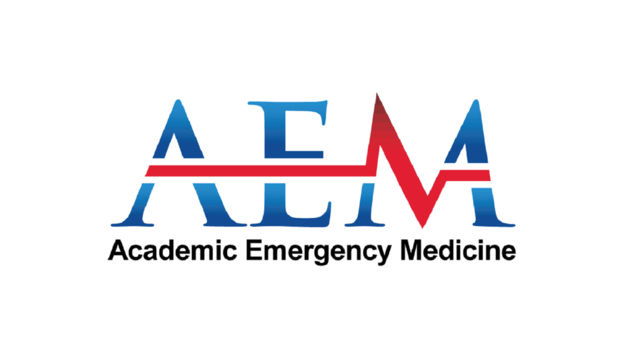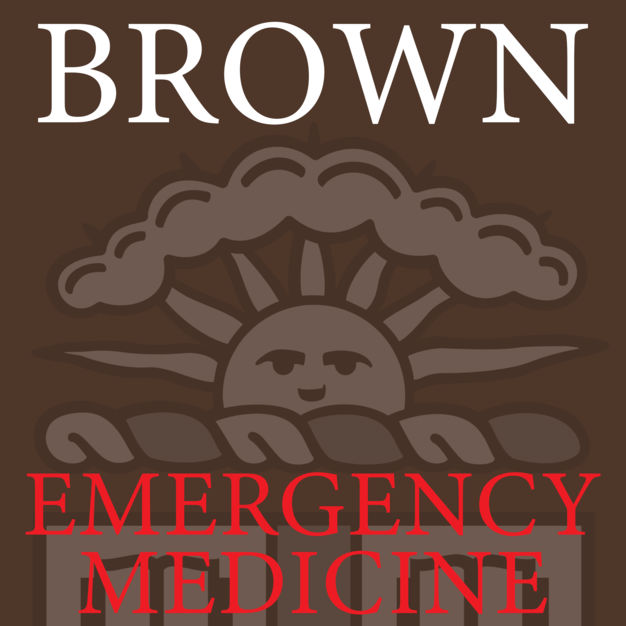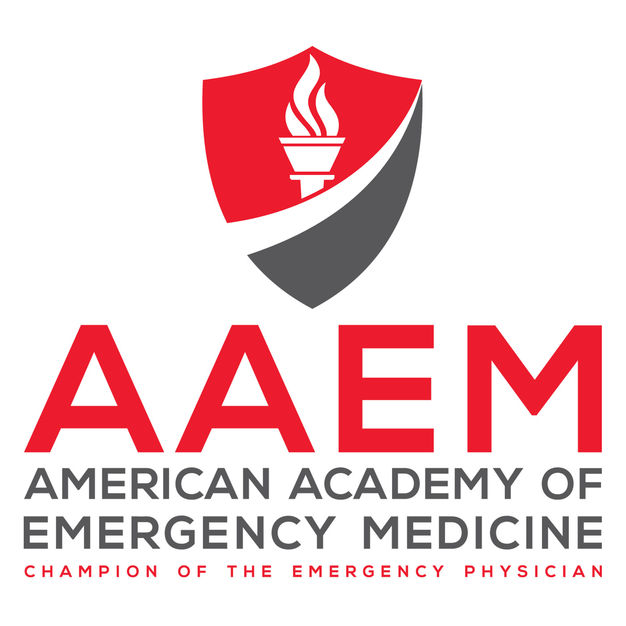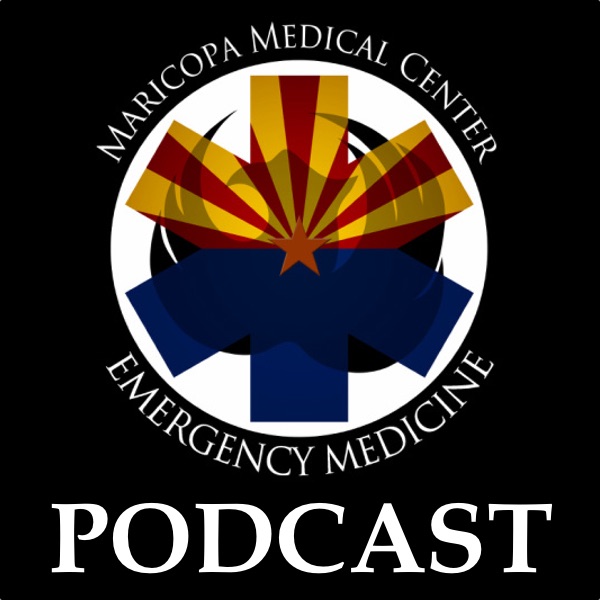
AEMEarlyAccess's podcast
Brown University Emergency Medicine, Academic Emergency Medicine/SAEM
This is a collaboration between the editors of Academic Emergency Medicine and the Brown University Emergency Medicine Residency Program. Each podcast offers a pre-publication look at a chosen article, with an interview with its corresponding author. Visit www.brownemblog.com (AEM Early Access section) to find the links to each article and other related educational materials.
- 18 minutes 2 secondsAEM Early Access 82: Correlation of vital sign centiles with in-hospital outcomes among adults encountered by emergency medical services
In this study, the authors first sought to empirically derive centiles for heart rate (HR), respiratory rate (RR), and systolic blood pressure (SBP) for adults with out-of-hospital emergencies who were transported to an ED. Second, they aimed to evaluate the impact of adjusting for age in the evaluation of centile curves for vital signs to identify practical targets for adjustment of vital signs classification in adult patients based on age categories. Third, they examined the association of both unadjusted and age-adjusted vital signs with hospital admission and in-hospital mortality.
16 March 2024, 7:19 pm - 16 minutes 54 secondsAEM Early Access 81:Initial Treatment of Uninsured Patients with ST-Elevation Myocardial Infarction by Facility PCI Capabilities
Timely reperfusion is necessary to reduce morbidity and mortality in patients with ST-elevation myocardial infarction (STEMI). Initial care by facilities with percutaneous coronary intervention (PCI) capabilities reduces time to reperfusion. The authors sought to examine whether insurance status was associated with initial care at EDs with PCI capabilities amongst adult patients with STEMI.
7 March 2024, 11:28 am - 20 minutes 59 secondsAEM Education and Training 54: Our responsibility to patients: Maintain competency or stop practicing
Dr. Sally Santen and Dr. Martin Pusic discuss their team's new commentary and perspective piece in AEM Education and Training entitled, "Our responsibility to patients: Maintain competency or ... stop practicing."
15 February 2024, 3:24 pm - 24 minutes 15 secondsAEM Education and Training 53: Brain versus bot: Distinguishing letters of recommendation authored by humans compared with artificial intelligence
The use of generative artificial intelligence (AI) tools, such as ChatGPT, are gaining popularity for a variety of academic writing tasks and offer an innovative solution to relieve the burden of letter writing. The authors conducted a study aimed at determining whether academic physicians can distinguish between AI and human-generated letters of recommendation.
In the podcast the author references a gendered language calculator, which can be found here:
14 February 2024, 1:43 am - 19 minutesAEM Early Access 80: The differences in code status conversation approaches reported by emergency medicine and palliative care clinicians: a mixed method study
Conversations about code status in seriously ill patients at end of life is unfortunately a frequent event in the emergency department. Today we are discussing a paper in AEM entitled The differences in code status conversation approaches reported by emergency medicine and palliative care clinicians: a mixed method study. Lead author Dr. Kei Ouchi is here to discuss it with us.
8 January 2024, 4:53 pm - 17 minutes 46 secondsAEM Early Access 79: A Qualitative Analysis of Patients’ Experiences with an ED Diagnosis of GI Cancer
We discuss this new article, A Qualitative Analysis of Patients’ Experiences with an ED Diagnosis of GI Cancer, with senior author Dr. Haejin In.
17 December 2023, 9:33 pm - 31 minutes 31 secondsAEM Education and Training 52: Making decisions “in the dark”: Learning through uncertainty in clinical practice during Covid-19
Today we are speaking to senior author Dr. Dmitri Papanagnou about his team’s new paper in AEM Education and Training entitled Making decisions “in the dark”: Learning through uncertainty in clinical practice during Covid-19.
13 December 2023, 10:37 pm - 14 minutes 21 secondsAEM Early Access 78: Association of Limited English Proficiency with Emergency Department Irregular Departures and Return Visits: A Cross-sectional Cohort Study in the Upper Midwest Between January 2018 and December 2021
Patients with (LEP) have been shown to experience disparities in (ED) care. The objectives of this study were to examine the LEP and irregular ED departures and return ED visits. We interview senior author Dr. Derick Jones about this new AEM paper.
3 November 2023, 6:14 pm - 17 minutes 49 secondsAEM Early Access 79: Emergency medicine physician workforce attrition differences by age and gender
Emergency care workforce concerns have gained national prominence given recent data suggesting higher than previously estimated attrition. With little known regarding characteristics of physicians leaving the workforce, this paper sought to investigate the age and number of years since residency graduation at which male and female EM physicians exhibited workforce attrition. We speak with primary author Dr. Cameron Gettel.
26 October 2023, 11:14 pm - 18 minutes 37 secondsAEM Education and Training 51: Perspectives on preparedness for pediatric emergencies after residency: A needs assessment
General emergency physicians provide most pediatric emergency care in the United States yet report more challenges managing emergencies in children than adults. Recommendations for standardized pediatric emergency medicine (PEM) curricula to address educational gaps due to variations in pediatric exposure during emergency medicine (EM) training lack learner input. This study surveyed senior EM residents and recent graduates about their perceived preparedness to manage pedi- atric emergencies to better inform PEM curricula design.
12 October 2023, 7:02 pm - 12 minutes 46 secondsAEM Education and Training 50: I'd Rather See Action: “I’d rather see action”: Application and recruitment experiences of underrepresented in emergency medicine trainees
Dr. Pensa interviews author Dr. Michelle Suh about her teams recent E&T publication, “I’d rather see action”: Application and recruitment experiences of underrepresented in emergency medicine trainees."
15 September 2023, 6:07 pm - More Episodes? Get the App
Your feedback is valuable to us. Should you encounter any bugs, glitches, lack of functionality or other problems, please email us on [email protected] or join Moon.FM Telegram Group where you can talk directly to the dev team who are happy to answer any queries.
 5 x 5 : Evidence Based Medicine
5 x 5 : Evidence Based Medicine
 AAEM/RSA Podcasts
AAEM/RSA Podcasts
 AAEM Podcasts: Emergency Medicine Breve Dulce Talks
AAEM Podcasts: Emergency Medicine Breve Dulce Talks
 Brown Emergency Medicine
Brown Emergency Medicine
 AAEM Podcasts: Emergency Medicine Operations Management
AAEM Podcasts: Emergency Medicine Operations Management
 Maricopa Emergency Medicine Podcast
Maricopa Emergency Medicine Podcast